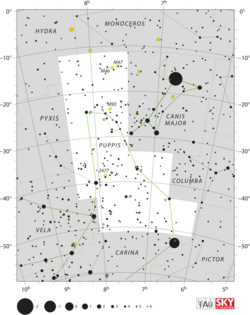Astronomy:Nu Puppis
| Observation data Equinox J2000.0]] (ICRS) | |
|---|---|
| Constellation | Puppis |
| Right ascension | 06h 37m 45.67135s[1] |
| Declination | −43° 11′ 45.3602″[1] |
| Apparent magnitude (V) | 3.173[2] |
| Characteristics | |
| Spectral type | B8 III[3] |
| U−B color index | −0.397[2] |
| B−V color index | −0.113[2] |
| Astrometry | |
| Radial velocity (Rv) | +30.9[4] km/s |
| Proper motion (μ) | RA: −0.44[1] mas/yr Dec.: −3.87[1] mas/yr |
| Parallax (π) | 8.78 ± 0.26[1] mas |
| Distance | 370 ± 10 ly (114 ± 3 pc) |
| Absolute magnitude (MV) | −2.11[5] |
| Details | |
| Radius | 4.2[6] R☉ |
| Luminosity | 767[7] L☉ |
| Luminosity (bolometric) | 1,340[8] L☉ |
| Temperature | 12,120[9] K |
| Rotational velocity (v sin i) | 225[10] km/s |
| Other designations | |
| Database references | |
| SIMBAD | data |
Nu Puppis (ν Puppis) is a solitary,[12] blue-hued star in the southern constellation of Puppis. It is the fifth-brightest star in Puppis, with an apparent visual magnitude of 3.17.[2] Based upon an annual parallax shift of 8.78 mas as seen from Earth,[1] it is located about 370 light years from the Sun. The system made its closest approach about 3.6 million years ago when it underwent perihelion passage at a distance of roughly 27 light years.[13]
The star has a stellar classification of B8 III,[3] matching a B-type giant. Absorption lines in the spectrum are displaying central quasi-emission peaks, indicating this is a Be shell star with a circumstellar disk of heated gas that is being seen edge-on.[14] ν Puppis is a candidate variable star showing an amplitude of 0.0117 magnitude with a frequency of 0.15292 per day.[15] It is spinning rapidly with a projected rotational velocity of 225 km/s. This rotation is giving the star an oblate shape, with the equator being 31% larger than the poles.[10] It is radiating (after allowance for ultraviolet radiation) 1,340[8] times the Sun's luminosity from its photosphere at an effective temperature of 12,120 K.[9]
References
- ↑ 1.0 1.1 1.2 1.3 1.4 1.5 van Leeuwen, F. (2007), "Validation of the new Hipparcos reduction", Astronomy and Astrophysics 474 (2): 653–664, doi:10.1051/0004-6361:20078357, Bibcode: 2007A&A...474..653V.
- ↑ 2.0 2.1 2.2 2.3 Cousins, A. W. J. (1973), "Revised zero points and UBV photometry of stars in the Harvard E and F regions", Memoirs of the Royal Astronomical Society 77: 223–236, Bibcode: 1973MmRAS..77..223C.
- ↑ 3.0 3.1 Houk, Nancy (1978), Michigan catalogue of two-dimensional spectral types for the HD stars, 2, Ann Arbor: Dept. of Astronomy, University of Michigan, Bibcode: 1978mcts.book.....H.
- ↑ Gontcharov, G. A. (November 2006), "Pulkovo Compilation of Radial Velocities for 35495 Hipparcos stars in a common system", Astronomy Letters 32 (11): 759–771, doi:10.1134/S1063773706110065, Bibcode: 2006AstL...32..759G.
- ↑ Anderson, E.; Francis, Ch. (2012), "XHIP: An extended hipparcos compilation", Astronomy Letters 38 (5): 331, doi:10.1134/S1063773712050015, Bibcode: 2012AstL...38..331A.
- ↑ Pasinetti Fracassini, L. E. et al. (2001), "Catalogue of Apparent Diameters and Absolute Radii of Stars (CADARS)", Astronomy & Astrophysics 367: 521–24, doi:10.1051/0004-6361:20000451, Bibcode: 2001A&A...367..521P.
- ↑ McDonald, I. et al. (2012), "Fundamental Parameters and Infrared Excesses of Hipparcos Stars", Monthly Notices of the Royal Astronomical Society 427 (1): 343–57, doi:10.1111/j.1365-2966.2012.21873.x, Bibcode: 2012MNRAS.427..343M.
- ↑ 8.0 8.1 Kaler, James B. (March 28, 2008), "NU PUP (Nu Puppis)", Stars (University of Illinois), http://stars.astro.illinois.edu/sow/nupup.html.
- ↑ 9.0 9.1 Soubiran, C. et al. (June 2010), "The PASTEL catalogue of stellar parameters", Astronomy and Astrophysics 515: A111, doi:10.1051/0004-6361/201014247, Bibcode: 2010A&A...515A.111S.
- ↑ 10.0 10.1 Belle, G. T. (2012), "Interferometric observations of rapidly rotating stars", The Astronomy and Astrophysics Review 20 (1): 51, doi:10.1007/s00159-012-0051-2, Bibcode: 2012A&ARv..20...51V.
- ↑ "nu. Pup". SIMBAD. Centre de données astronomiques de Strasbourg. http://simbad.u-strasbg.fr/simbad/sim-basic?Ident=nu.+Pup.
- ↑ Eggleton, P. P.; Tokovinin, A. A. (September 2008), "A catalogue of multiplicity among bright stellar systems", Monthly Notices of the Royal Astronomical Society 389 (2): 869–879, doi:10.1111/j.1365-2966.2008.13596.x, Bibcode: 2008MNRAS.389..869E.
- ↑ Bailer-Jones, C. A. L. (March 2015), "Close encounters of the stellar kind", Astronomy & Astrophysics 575: 13, doi:10.1051/0004-6361/201425221, A35, Bibcode: 2015A&A...575A..35B.
- ↑ Rivinius, Th. et al. (August 1999), "Central quasi-emission peaks in shell spectra and the rotation of disks of Be stars", Astronomy and Astrophysics 348: 831–842, Bibcode: 1999A&A...348..831R.
- ↑ Koen, Chris; Eyer, Laurent (2002), "New periodic variables from the Hipparcos epoch photometry", Monthly Notices of the Royal Astronomical Society 331 (1): 45–59, doi:10.1046/j.1365-8711.2002.05150.x, Bibcode: 2002MNRAS.331...45K.
 |


